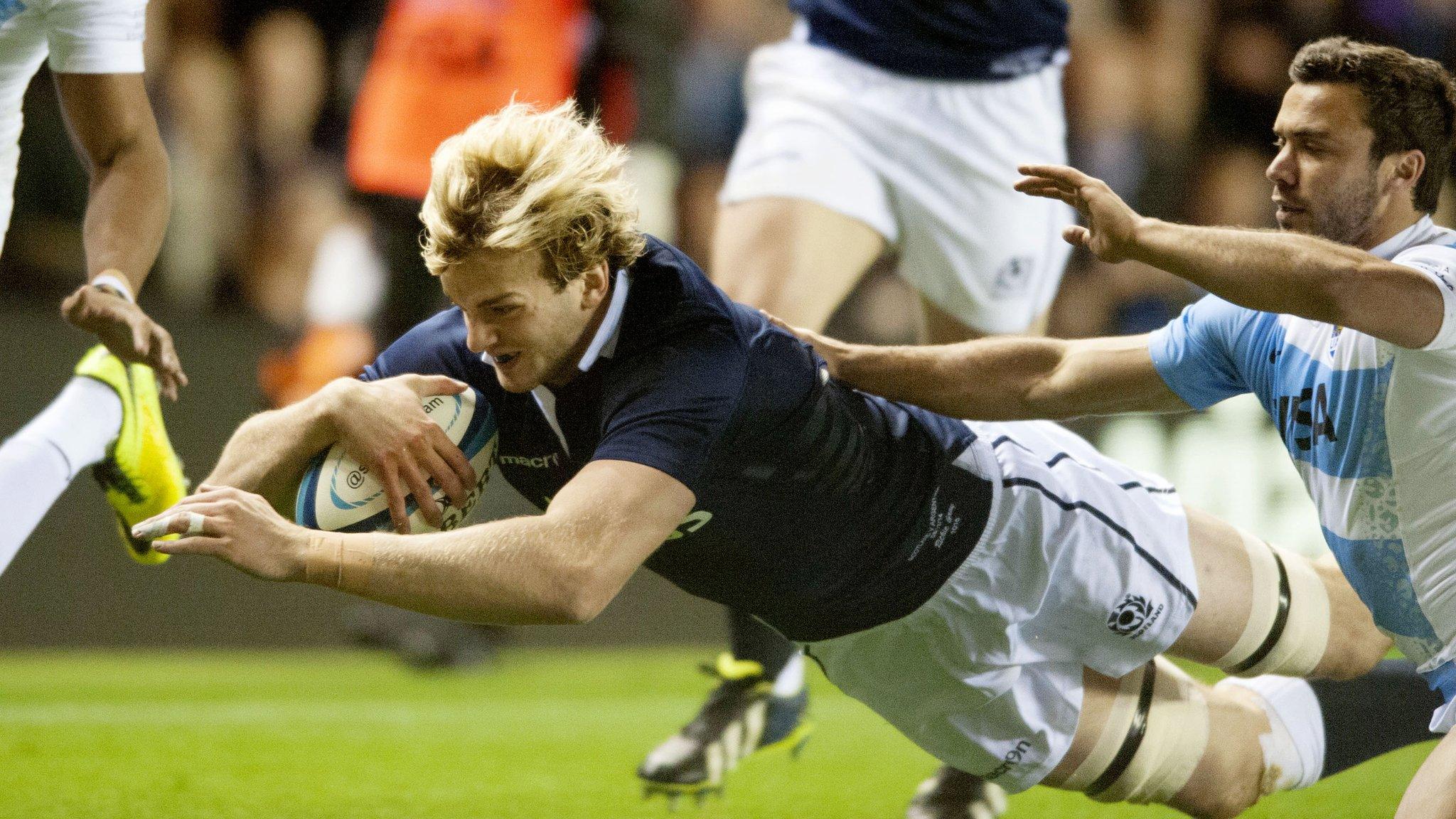Mike Blair: Scots cannot give All Blacks too much respect
- Published

Mike Blair admits taking on the world champions All Blacks is a daunting prospect for Scotland
Autumn international: Scotland v New Zealand |
|---|
Venue: BT Murrayfield Stadium, Edinburgh Date: Saturday, 15 November Kick-off: 17:30 GMT |
Coverage: Live on BBC Two, BBC Radio Scotland, BBC Radio 5 live sports extra & online; live text commentary on the BBC Sport website |
How do you beat the All Blacks? And the first response is probably "with difficulty".
However, teams are getting closer to beating them and I don't just mean South Africa - Australia have had them struggling, England beat them at Twickenham a couple of years ago, Ireland should have beaten them at the Aviva last year.
Now, don't get me wrong, this New Zealand squad over the past few years have often been touted as the best ever and have regularly made quality opposition look like third rate operators.
But if Scotland can play to the very best of their abilities, be clinical when opportunities arise and be able to weather the inevitable onslaught of power, precision and skill, then this might not be as one-sided an affair as we have witnessed over the past decade or so.
.jpg)
Former New Zealand star Hosea Gear proved a huge threat to the Scots in previous matches
I've played against New Zealand when you could do nothing to prevent a try, like the time when Hosea Gear scored against us. It came from a set piece scrum where Sonny Bill Williams got smashed by two Scotland players, yet three seconds later Gear was dotting the ball down under the posts after a ludicrous one handed offload.
But I've also seen Dan Carter throwing an intercept for Tim Visser to score at Murrayfield.
The message must be that these players are human and they will make mistakes. But they won't make mistakes if they are not pressured, if they are allowed to play.
Scotland must harry them, make every ball a scrap, get up in their faces, put heat on their kickers, intimidate. They must work like men possessed.
Mike Blair |
|---|
"It terms of selection, 13 changes to the New Zealand side points to it being slightly experimental, but this can often mean they are even more dangerous." |
Frank Hadden, Scotland coach in 2005, showed the squad a five-minute video of all the errors that their individuals had made during the season, and it does hit home that everyone makes mistakes. The key is to make the most of them, and Scotland have the firepower to do so.
On the flip side, New Zealand are the most clinical of finishers and they jump on opposition errors. Turnovers and counter attack are their main source of tries, so what does that mean? Look after ball in contact - helped by running at shoulders, kick competitively and organise your chase line. Basic things, but the game is built on them.
Defensively, New Zealand have increased their line speed, especially their first five to six players from the ruck outwards.
They come aggressively off the line in an 'up and out' shape. This has created some opportunities for the Scottish attack though.
The area of weakness is the inside pass from the first receiver but the timing and width of pass is key; drag the defence across then use one of your back three coming through where the ruck was, on a slightly wider 7-8m inside pass. The defender who is going to tackle you will be the first defender on the other side of the ruck so any skulduggery to keep him from getting in that defensive position would be beneficial.

Dan Carter makes his first start for New Zealand in around a year at Murrayfield on Saturday
Ex-Edinburgh and All Black captain Todd Blackadder used to say, "rugby is all about the little things" and a tug of a shirt here or there can make a big difference.
It terms of selection, 13 changes to the New Zealand side points to it being slightly experimental, but this can often mean they are even more dangerous.
With the World Cup less than a year away this may be some players' one and only chance to prove they have what it takes.
In many positions they are as talented but don't have the experience of their compatriots.
Don't ever underestimate a New Zealand side, but at the same time don't give them too much respect.
- Published13 November 2014

- Published13 November 2014

- Published10 November 2014

- Published8 November 2014

- Published10 November 2014

- Published9 November 2014

- Published8 November 2014

- Published8 November 2014

- Published14 September 2016

- Published25 August 2011
